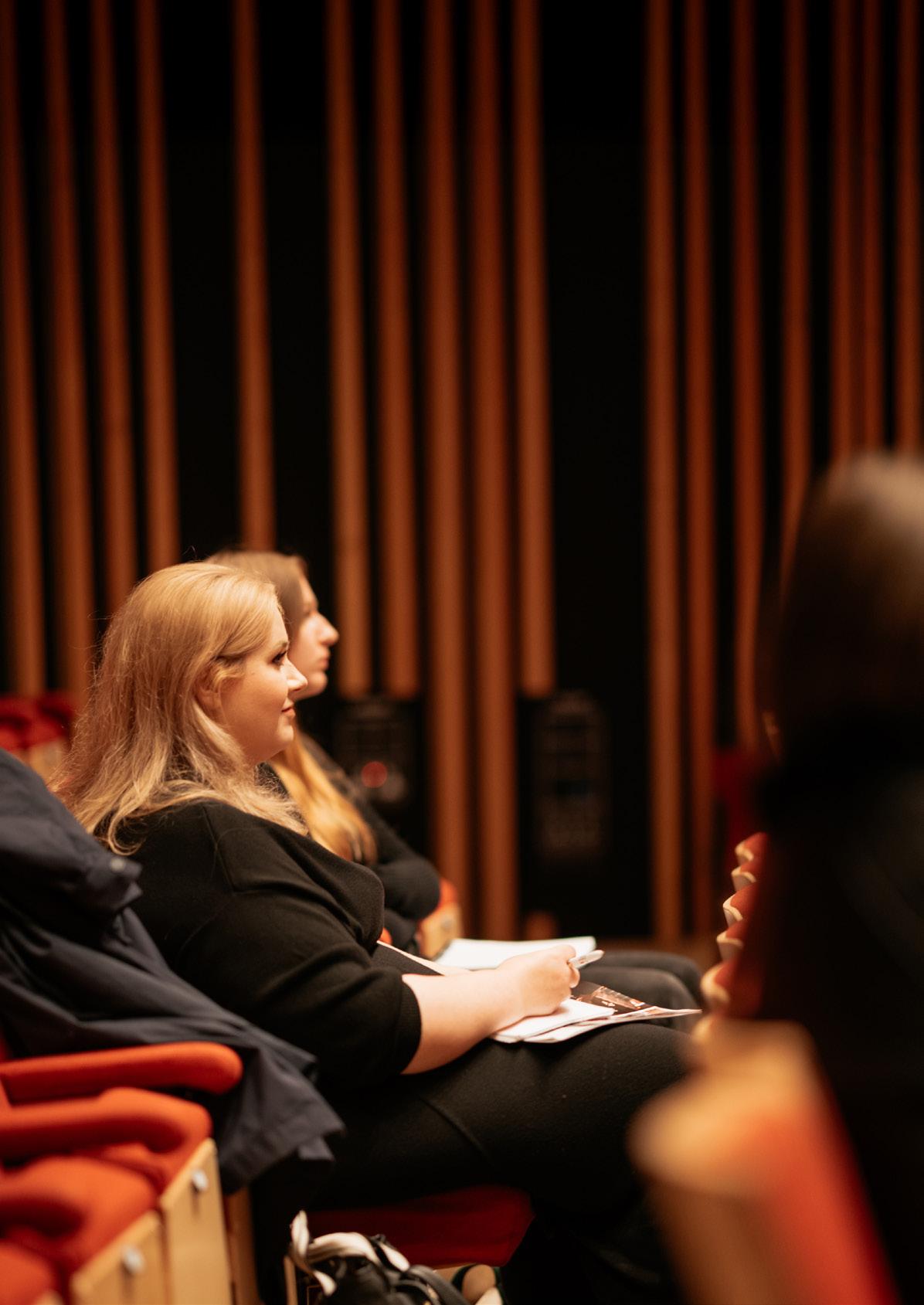
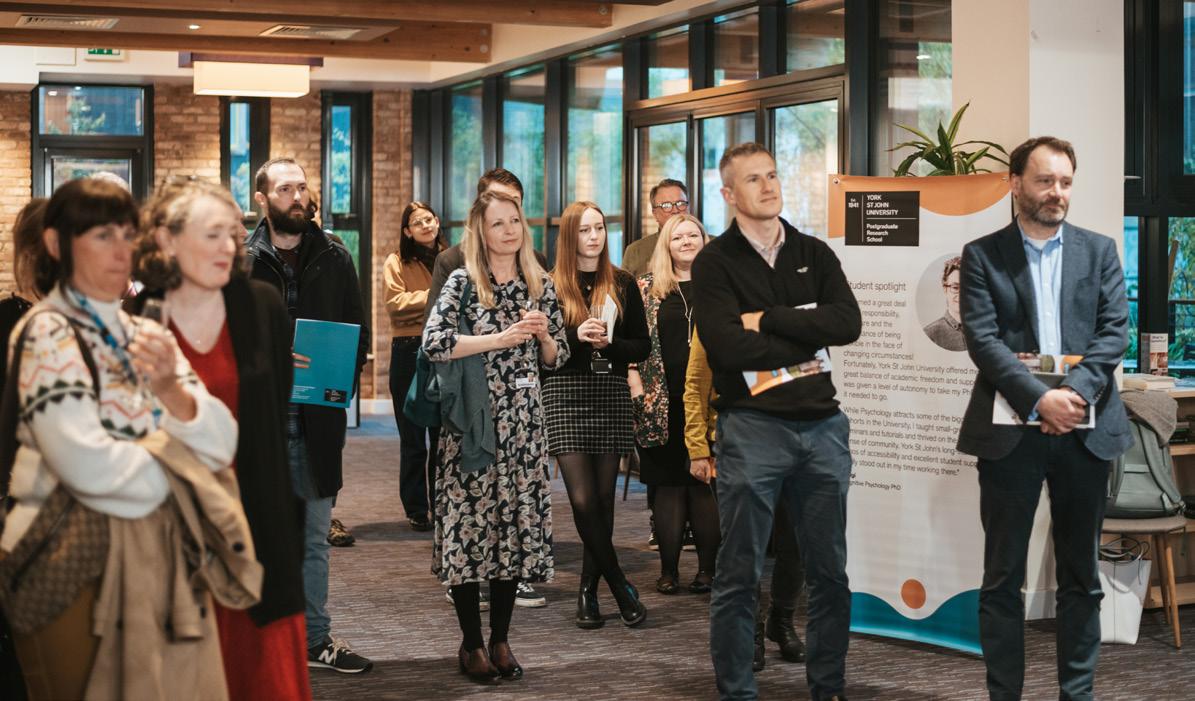
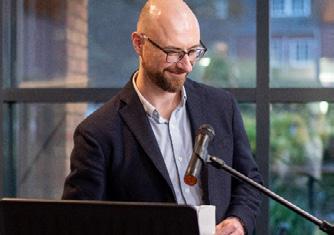

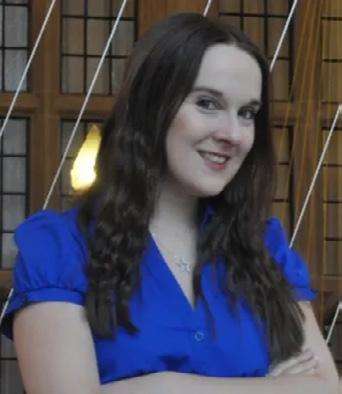
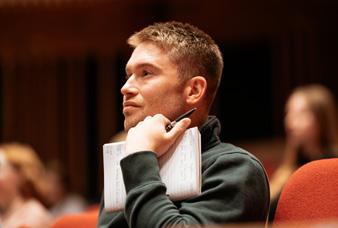







October 2024 marked a major milestone for York St John University with the official launch of the Postgraduate Research (PGR) School—a dedicated hub for supporting our growing community of research students and fostering world-class, transformative research.
Since its inception, the PGR School has become a vibrant centre of activity, welcoming a diverse range of researchers and expanding the scope of inquiry across disciplines. The launch reflects YSJ’s commitment to building a research culture that is inclusive, diverse and exciting.
The School was formally launched on 9th October 2024 with a celebratory event that brought together PGRs, academic staff, and external guests. The occasion was marked by inspiring speeches from:
• Professor Karen Bryan OBE , Vice Chancellor
• Professor Andrew Hill, Associate Pro-Vice Chancellor for Research and Head of the PGR School
• Caitlin Veal, PGR Representative, Academic Associate, and Doctoral Researcher in York Business School
The event also commemorated a significant transition in YSJ’s research journey. Until 2015, all postgraduate researchers at York St John were candidates for degrees awarded by the University of Leeds. In 2017, YSJ proudly awarded its first Master’s by Research and PhD degrees—an achievement that laid the foundation for the new School.
We were honoured to welcome Professor Luke Windsor, Head of the Doctoral College at the University of Leeds, who joined us to celebrate this new chapter and reflect on the longstanding partnership between our institutions.
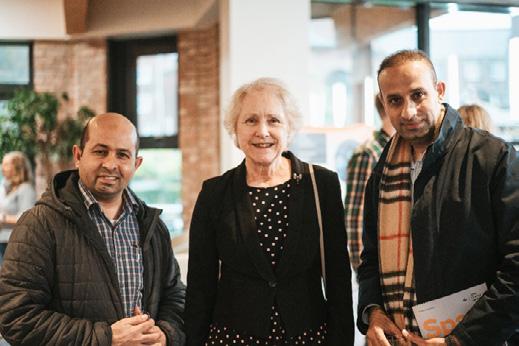
Emily Smith - Postgraduate Research School Manager
Emily manages the strategic and operational activities of the PGR School and its team to support and develop the growing PGR community at York St John, while monitoring the delivery of our commitment to postgraduate research.
Jill Graham - PGR Officer for Monitoring and Assessment
Jill is responsible for managing the PGR student records and associated e:Vision processes. She also has oversight of the examination processes and can advise on regulatory matters for research degrees.
Victoria Lain - PGR Officer for Scholarships and Funding
Victoria supports the creation of studentships and scholarships which provide funding for PGR study as well as facilitating the internal PGR funding opportunities provided by York St John.
Since the launch, the PGR School has hosted three induction events, welcoming over fifty new postgraduate researchers into the community. The team has also expanded, with two new staff members joining to support the School’s development and ensure researchers receive the guidance and resources they need.
Looking ahead, the PGR School is set to play a central role in shaping the future of research at YSJ. With ambitious plans and a growing network of scholars, the School is committed to supporting postgraduate researchers as they pursue innovative, impactful work that makes a difference—locally and globally.
Amy Langton - PGR Officer for Community and Engagement
Amy focuses on maintaining and building a positive and inclusive PGR community. This includes organising PGR events, our PGR induction and looking at how the PGR School can improve communications and engagement with our current PGR community.
Richard Bracknellin - PGR Officer for Training and Development
Richard is responsible for coordinating the training and development opportunities available to PGRs at York St John. He also administers a growing programme of professional development activity for PGR supervisors at all levels of experience, aligned with the United Kingdom Council for Graduate Education’s (UKCGE) Good Supervisory Practice Framework.
Dominic Hogan - PGR Officer for Admissions and Recruitment
Dominic handles the postgraduate research admissions for PhDs, MSc/ MA by Research and MRes. He ensures that new applications are processed correctly, liaising with relevant supervisors, School Research Leads and the visa teams.
Lauren Cowling - PGR Officer for Admissions and Recruitment/ Research Office Administrator
Lauren handles the postgraduate research admissions for PhDs, MSc/ MA by Research and MRes. They ensure that new applications are processed correctly, liaising with relevant supervisors, School Research Leads and the visa teams.
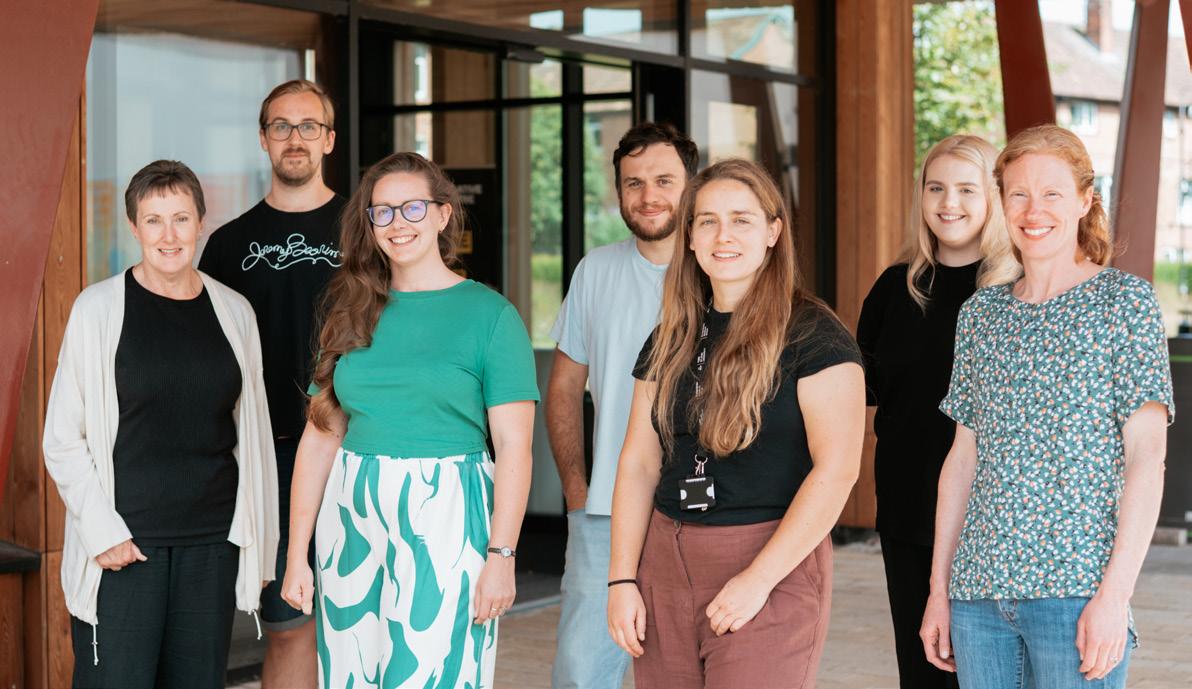
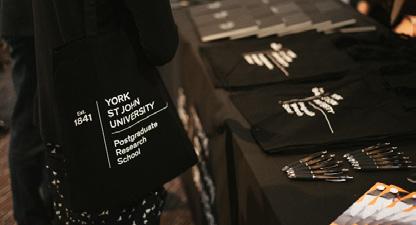
October 2024
We kicked off the academic year with several exciting milestones: the 6th Annual Postgraduate Research School Conference, the official launch of the PGR School, and our October Induction event welcoming new postgraduate researchers.
February 2025
Our community continued to grow as we welcomed another cohort of PGRs during our February Induction.
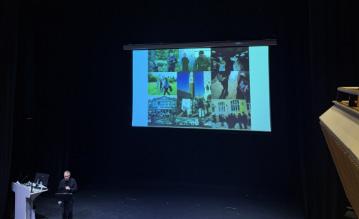
March 2025
On Tuesday 18th March, we helped to facilitate the third Spring Test—a vibrant School of the Arts PGR event led by Professor Claire Hind. The event featured guest speakers Dr Saba Zavarei and Professor Tim Brennan, alongside insightful panel contributions from Kerry Fox, Alex Crowton, Ewan East, Dr Amy Skinner, Dr Kiran Tanna, Dr Morag Galloway, and Professor Simon Proctor.

May 2025
The Three Minute Thesis (3MT) competition took place on Wednesday 14th May, celebrating the innovative research of our PhD students. Congratulations to Chloe Atkins, who won both the first-place prize and the People’s Choice Award for her compelling presentation:
“Then in walked an IDVA”: Domestic Violence and Protective Orders under Private Law – the role of the IDVA (Independent Domestic Violence Advocate) in addressing victim navigation, experience and safety.
June 2025
June was packed with activity, including our PGR Induction and the inaugural Careers Symposium—a dynamic event that brought together careers specialists, academics, and alumni to share their career journeys and explore opportunities beyond the research degree. (Read more about the Careers Symposium on pages 21-23). In collaboration with York Business School PGR Leads Dr Jenny Hall and Dr Steven Hirschler, we also hosted a PGR Poster Showcase, where five PGRs were awarded prizes for their outstanding poster designs.
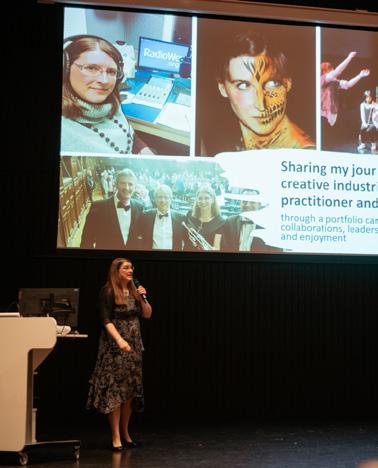
August 2025
The results of the Postgraduate Research Experience Survey (PRES) were released, and we’re proud to share that York St John ranked 5th nationally for Supervision among 89 participating institutions—achieving an impressive 93% satisfaction score A huge congratulations to our dedicated PGR Supervisors!
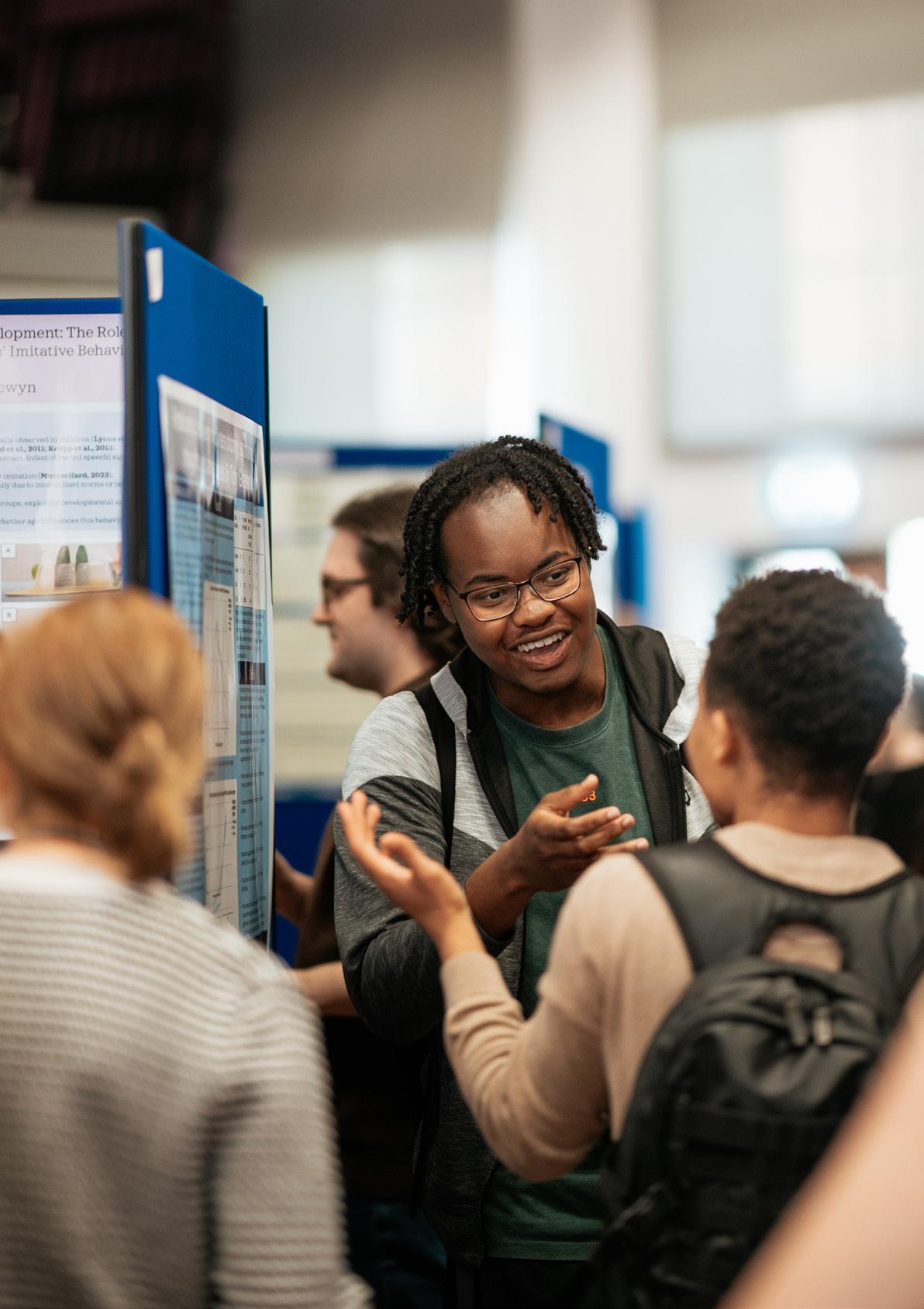

Lowen Eleanor Frampton-Thorburn
We are the York Society of Hauntologists, a Folk Horror reading group in collaboration with the Hauntology and Spectrality Research Group at York St John University. Our aim is to create a space for people interested in Hauntology, Folk Horror, Psychogeography, and other similarly spooky themes to come together in the city of York for a sharing of ideas and discussion. The Society is open to anyone – YSJ students, staff, members of the public, your weird neighbour – all with an interest in discovering more Folk Horror and talking about it with other like-minded people and a beverage in a (reputedly haunted) pub. We meet on the last Wednesday of the month at 7pm at the Black Swan Inn, Peaseholme Green, York.
Before I had started my PhD - before I even knew for certain I would actually be doing it, really - I went along to a workshop with the Hauntology and Spectrality Research Group. The aim of the workshop was to look at what the group had done thus far and come up with some ideas for future events and outputs. I had some really interesting chats with some intimidatingly cool people, a lot of which revolved around recommendations for things we might like to read or watch or listen to, based on shared interests. I approached the organisers – soon to be my PhD
supervisors, unbeknownst to me at the time - towards the end of the event, and said that I thought it could be an idea for the research group to have a book club where people could share all of these recommendations. Their response was “yes, great – we’d love for you to organise that!”
I’d never attended a book club in my life, let alone organised one.
And yet – somehow – I did. I knew of a nice spooky pub I could use and booked a room, I made some posters advertising our first meeting and put them up around town, and I set up a little Instagram account. I flicked frantically back and forth through a book I had recently acquired to find something for us to read – Damnable Tales: A Folk Horror Anthology selected and illustrated by Richard Wells (there is a copy in YSJ library – if you’re thinking about reading it, you should).
It was there that I found ‘Randalls Round’ by Eleanor Scott, a short story about an eerie Morris Dance (that may or may not be a cover for some residual pagan ritual sacrifice), set in a quaint country village, which had the benefit of being set on All Hallows Eve. As Halloween was approaching, the timing couldn’t have been better.
And, most surprisingly, many people came back the next month, and the next month, until we ended up with a regular monthly slot at the pub for the Society of Hauntologists.
Our first meeting was a resounding success!
Far more people came than I could ever have imagined –academics, PGRs, undergrads, and even members of the public. I opened the meeting with a dramatic reading of ‘Randalls Round’ for anyone who hadn’t had time to read it before the meeting, and the discussion lasted well into the night. And, most surprisingly, many people came back the next month, and the next month, until we ended up with a regular monthly slot at the pub for the Society of Hauntologists.
I no longer begin each meeting with a dramatic reading of the text for the month, because some of them have been quite long. Our meetings have covered a range of readings, contemporary and much older, including Barrowbeck by Andrew Michael Hurley, The Dark is Rising by Susan Cooper, Man-Size in Marble by Edith Nesbit (along with its TV adaptation ‘Woman of Stone’ which had just aired as the BBC’s ‘Ghost Story for Christmas’), and the recently published Sorrow Spring by Olivia Isaac-Henry. The Society of Hauntologists also featured at the ‘Hauntology Day’ of the York Literature Festival in March with a sold-out special meeting.
We now also take requests! The Society of Hauntologists blog site has a page where people can submit ideas for readings, so that the group can become the collaborative space for sharing recommendations I had originally hoped it would be (rather than my own personal tyrannical book dictatorship, which was fun while it lasted *sigh*).
You can also find us on Instagram @yorkhauntologists
Lowen Eleanor Frampton-Thorburn (they/them) is a PhD student with the Hauntology and Spectrality Research Group. Their research topic is Folk Horror film and literature, specifically that which is set or filmed in Cornwall, or which makes use of Cornish folklore/folk customs or heritage. They are particularly interested in how Cornish landscapes, folk, and folklore are portrayed within Folk Horror, and how these concepts influence the narrative and aesthetics of these texts. Drawing on ideas such as Hauntology and Psychogeography, as well as the context of Cornwall’s history, geography, economic and political reality, and its position and perception within the public consciousness, their thesis seeks to apply current Folk Horror scholarship on the importance of ‘the land’ in Folk Horror to a particular landscape or geographical area - and all that resides within that landscape - to explore its effect.
At the time this is published, they will have just started their second year of a 7 year part-time project, by which point they will have presented at two conferences and be organising a third, all while being baffled at how they managed to do that.

To find out what our meetings are really like, take a look at our blog to find out when our next meeting is, and what we’re reading:
Caitlin Veal, PhD candidate and Academic Associate in the Social Sciences
Caitlin Veal, a third-year PhD candidate and Academic Associate in the Social Sciences, is now stepping into the final chapter of her doctoral journey. Over the past 2 years Caitlin has served as a Postgraduate Research (PGR) Representative for York Business School, as well as an Academic Associate—roles that have shaped her experience and deepened her connection to the postgraduate community.
In this reflective piece, Caitlin shares insights into the challenges and rewards of her time as a Rep, the importance of building bridges between students and staff, and how these roles have enriched her personal and professional development.
I first decided to apply to be a PGR rep because I was keen to meet new people and build the PGR community here at YSJ. Being a PGR Rep has been such an enjoyable experience over the past three years, and opened the door for opportunities and experiences I wouldn’t have otherwise had!
A main aspect of the PGR Rep role is attending University Research Committee (URC) and Research Degrees Committee (RDC) meetings which occur a few times a year. These meetings are where members of staff from across the university meet to discuss policy changes around research and the research degrees such as Master’s by Research and PhDs, to try and streamline any necessary processes and iron out any issues that may arise within these areas. Although it can be a little intimidating, the meeting schedule always allowed the PGR reps to bring
any concerns of questions on behalf of the wider PGR community, straight to the people who are able to make changes and decisions to help them. Members of the committee were always so welcoming and eager to hear from us Reps, which made the experience feel very rewarding. It is important to ensure that the PGRs themselves are represented in these scenarios, when decisions are being made directly about them – particularly as sometimes certain issues may go
unaddressed or the committee may be unaware of them. It was always so fascinating to see important decisions being made and to get an insight into the way the university works behind the scenes.
Aside from these more serious aspects to the role, I’ve also had the opportunity to help organise many PGR events and socials. From my first year in the role, I helped organise a monthly coffee afternoon to give PGRs from
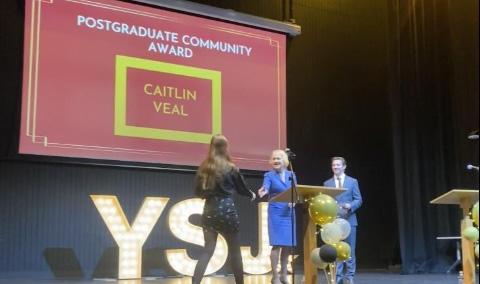
The experience has offered me many valuable insights into how the university works, and I am so grateful to have met so many interesting people along the way.
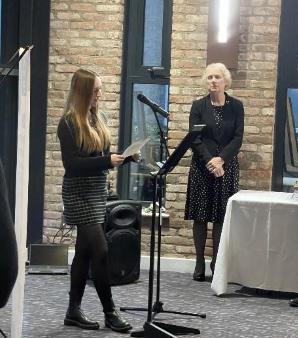
across the many different departments and schools the opportunity to meet and get to know each other. It was so rewarding to meet people I otherwise would not have had the opportunity to meet in my day-to-day life on campus. It also opened up the opportunity to find out about different groups and events that were taking place in other schools, and hear about all the different exciting PhD projects that are taking place across the university.
We also organised a PGR summer social to end the busy semester with cake.There have also been moments as a PGR rep which have been very rewarding, and allowed me to do things that I never thought I’d be able to do. At the beginning of the 2024-25 academic year, the university launched the PGR school to develop the processes, support and opportunities available to PGRs, and make the PGR experience easier to navigate. For the launch of the PGR school, I was invited to give a speech at the event about what being a PGR at YSJ means to me. This was an amazing opportunity for me to reflect on my

time spent at YSJ, where I also studied as an undergraduate from 2016-2019. Giving a speech is not something I ever thought I’d be able to do due to suffering from anxiety for many years. But I didn’t want to miss the opportunity, so I challenged myself to do it, and I’m so glad I did! I believe that being a PGR rep has been one of the things that has helped me to build my confidence to be able to do things like this, though introducing me to many new unfamiliar experiences such as speaking at the committee meetings and allowing me to push myself out of my comfort zone through meeting so many new people. Looking back at the student I was when I first set foot on campus in 2016 as a shy and anxious fresher, I never would have believed that I’d be standing in the same spot giving a speech in front of so many important people all these years later!
Alongside personal achievements, I have also joined the PGR reps and PGR community in fundraising. In both 2024 and 2025, the PGR reps organised for a group of PGRs to take part in the York 10k race. With the support of the PGR community and beyond, myself and other PGR reps were able to raise £405 for York Mind in 2024, and £675 for Parkinson’s UK in 2025.
I am sad to be stepping away from the PGR rep role for my final year, but I’m so grateful to have had the opportunity. It has been great working alongside the Research Office and PGR School over the last three years. To anyone who is considering taking on the role, I couldn’t recommend it more! The experience has offered me many valuable insights into how the university works, and I am so grateful to have met so many interesting people along the way.
Emma Sunley, Masters (MSc) by Research June 2024-June 2026
The day I began my research degree I was thrilled to enter a fresh new chapter in my life. Twenty years had passed since my undergraduate degree in Geography (BSc) so it felt daunting and exciting. Having spent those two decades travelling, working, renovating houses, getting married and bringing up two children, I realised I wanted to return to academia as a mature student. I saw a studentship and knew immediately it was perfect for me, with my interest in how humans interact with nature; it also met my values in conservation and sustainable tourism. I was lucky enough to be awarded the studentship, and was determined to make an impact, personally and academically. I opted for the two years part time route, which fitted perfectly around my professional support role and allowed family time. Living an hour from campus the flexibility in my degree enabled me to balance commitments. Having a schedule and regular supervision really helped too!
In my research, through the lens of nature connection, I am exploring how engaging with dark skies can achieve a positive sense of wellbeing. My research has taken me to dark sky festival events in the North York Moors, which has been an international dark sky reserve since 2020. This special place hosts a diverse range of events annually in February and October, celebrating our dark skies and admiration of the cosmos, the nocturnal landscape and its wildlife. During my fieldwork, I have spoken with many different people,
investigating how engaging with dark skies makes them feel and how this nature interaction impacts their wellbeing. I am based within York Business School, but my research also aligns with the Institute for Social Justice.
During my first year I have already noticed how many new opportunities have arisen. It is true that the more you put into something the more you get out, and I knew as soon as I started my research degree that I wanted to be a postgraduate researcher (PGR) representative. This integrated me into the community here at York St John and enabled me to meet fellow PGRs on similar journeys at social events and conferences, while also being a voice at research committees. I have also presented my research through poster and spoken presentations including the Sustainability Research Conference at Leeds, an on-campus exhibition of research and was also delighted to win a prize for ‘Most inspiring research’ at the York Business School flagship poster event in June. With my £50 gift voucher prize I treated the family to delicious food which was a real boost for us all and in particular for my confidence, giving that sense of accomplishment for how far I had come.
Over the summer, I also presented at the Leisure Studies Association annual conference alongside my supervisors. These presentations not only increased my ability to share my research with others, they sparked interesting conversations and developed
connections. I also wrote an article for the North York Moors Association magazine ‘Voice of the Moors’ about my research in the National Park and joined two research groups on Visitor Experience and Ecological Justice. I would not have dreamed these opportunities were possible this time last year and am excited to complete my degree and look ahead to the future.
My studentship means so much to me and I am so grateful to those at York St John who have supported me so far in my research journey. I have received excellent support throughout from my supervisors, Associate Professor Jenny Hall and Professor Brendan Paddison, and the Postgraduate Research School who funded some of my fieldwork costs through the PGR Project Fund.
It can be challenging at times, but it is rewarding to see what you can achieve with dedication and drive. Having worked at York St John for 16 years, this is my time to shine, to develop and grow. I am excited to build on the knowledge and confidence gained during my degree.
York St John is small enough to get to know the campus, community, and beautiful city well, but it is also a place with potential for the greatest of personal growth and the building of meaningful connections during the research you achieve in your time here.

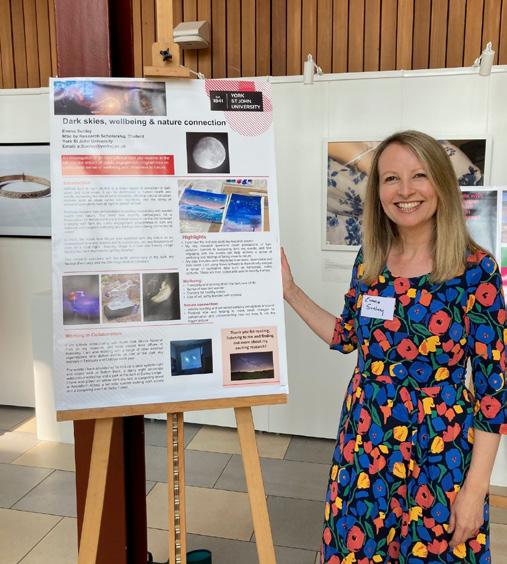
I was determined to make an impact, personally and academically.


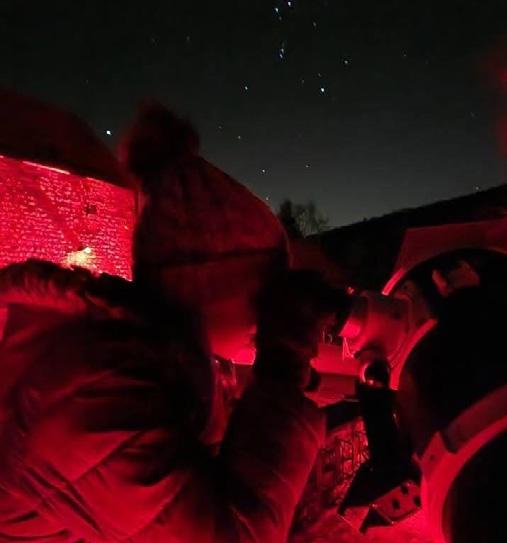
Georgia Spicer-Manning, PhD candidate and Academic Associate
Georgia, a PhD candidate and Academic Associate in the School of Education, Language and Psychology gives 5 tips of advice on starting a PhD.
Before joining YSJ, I completed my MSc in forensic psychology with the University of Kent and prior to this undertook my BSc in psychology at Bath Spa. My PhD focuses on female offenders who reside in a secure facility, looking at their experiences and how they are perceived by others. As I approach one year as a PhD student, here are a few points of advice I would have given myself when starting my degree a year ago:
I am very fortunate to have a wonderful supervisor (thanks Melanie!) who has helped to guide me through my first year. To this, I credit our first meeting, where we met in a relaxed setting and discussed our expectations. Your supervisor will be with you for many years, so it’s critical you both outline openly and honestly what you expect from the supervisory relationship, a stable foundation is the requirement for growth! Additionally remember that needs and availability can fluctuate throughout the year, the expectations you set out now don’t have to be set in stone.
Rome wasn’t built in a day, and neither is your PhD. Set reasonable expectations for yourself and make the project manageable, such as breaking large tasks into smaller ones to make them more approachable. Remember to have time off, you are able to take leave for a reason, so use it! For month-to-month time management, take regular days off that you know will work for you. I like to set aside my weekends to see friends, read a book and allow myself space to reset and for the week ahead.
everyone undertaking a PhD is on their own path and every project will look vastly different, it doesn’t mean you are any further ahead or behind.
www.yorksj.ac.uk/study/student-support/wellbeingand-welfare 1 2 4 3
Taking on a PhD is a massive accomplishment within itself, allow yourself credit for getting to this stage. Amongst all the excitement and stress, I’ve found that sometimes, it can take up a little too much of my focus. Catch-up conversations with friends and family can start to be dominated by discussing my research, and although they mean well, you are more than your PhD. You’re a human with hobbies and passions that span beyond your research. Ensure you allow yourself the time and space to pursue them!
Every PhD is, by its nature, inherently unique. Here at YSJ we’re fortunate to have a whole range of students. Even though my subject of choice is psychology, it’s great to chat with others about their projects, spanning multiple disciplines. It can be tempting to compare yourself to others, seeing someone launch their first study or finish a chapter, panicking that you’re behind by comparison. This is an unhelpful outlook, everyone undertaking a PhD is on their own path and every project will look vastly different, it doesn’t mean you are any further ahead or behind.
5
The number one priority throughout a PhD should always be your wellbeing. Taking on such a large project can feel overwhelming and stressful at times, which is why it’s important to reach out if you need to. Support can come from many places, such as talking to family and spending time with friends. The university has a range of resources available too, more information can be found by following the link below:
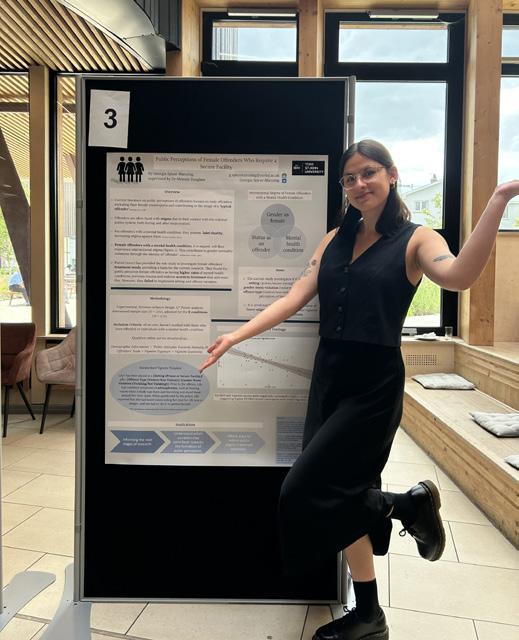
Rome wasn’t built in a day, and neither is your PhD
During the 2023–24 academic year, we were proud to launch the PGR Conference, Exhibition and Performance Fund—a dedicated source of support for PGRs presenting their work at academic and professional events. This initiative allowed the PGR Project Fund to be used more flexibly for other researchrelated needs, such as fieldwork, specialist equipment, materials for practice-led PhDs, and participant incentives.
The PGR School continues to champion opportunities for PGRs to showcase their research. Each academic year, PGRs can apply for:
• Up to £1,000 to support attendance at an in-person conference, exhibition, or performance (domestic or international)
• Up to £250 for participation in an online conference
Below, we hear directly from PGRs who received funding through the Conference, Exhibition and Performance Fund, as they share their experiences presenting their research at events across the globe.
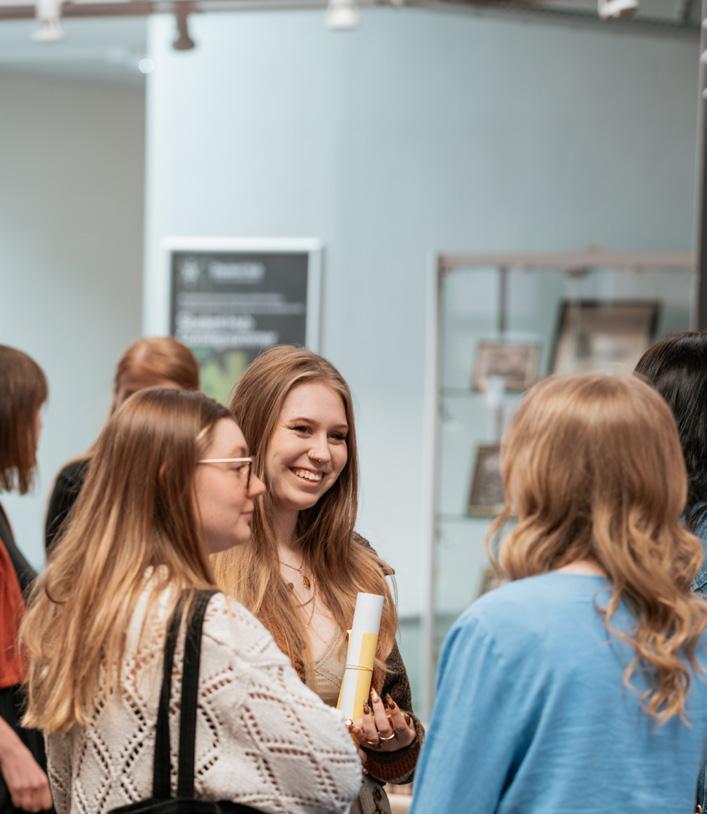
Darcy Neilson
This year, I had the incredible privilege of attending BCCCD25, a developmental psychology conferenced hosted in Budapest. This would simply not have been possible without the support of the PGR funding here at YSJ.
Connecting with field-leading experts (those whose papers I have read and re-read an embarrassing number of times!) at this event was a truly unmissable opportunity. The feedback I received after presenting my own research offered fresh perspectives and highlighted intersections with other fascinating studies shared at the conference (equipping me with plenty of further reading to keep me busy once I got home!).
This experience reaffirmed my passion for developmental psychology and strengthened my motivation to contribute to research
Lowen Eleanor Frampton-Thorburn
I’m really glad I chose to apply for the Falmouth University Haunted Modernities conference in the first year of my PhD. I was super nervous about it (and ended up submitting my abstract twice because I was worried they hadn’t received it) but everyone involved was really supportive and helpful. I signed up to present at a different conference at YSJ first, so that my first time presenting at a conference would be in a familiar place with familiar people rather than a whole new university. This was mostly a good idea as it meant I knew more about what to expect at a conference when I got to Falmouth and so was less anxious, though it did mean I had less time to prepare my paper because it came right off the back of another conference, so I did end up finishing the PowerPoint on the train to Cornwall.
Applying for funding was pretty straightforward, and all of my travel and accommodation was covered. There weren’t any hotels in the same town as the university which the YSJ travel team were able to book, but luckily the Falmouth conference team shared information about booking accommodation at a nearby campus in Penryn which I was able to pass on to the research office and got a place there (where incidentally most people I met at the conference were also staying!). This was in the next town over to where the conference was, but I managed to get extra funding from the conference fund to cover a bus ticket for the week to get me there and back which was really helpful. It’s good to look into the area and provide as much info as possible for YSJ travel, as someone I went with ended up several miles away in a completely different town because that was the nearest premier inn the travel team were able to book.
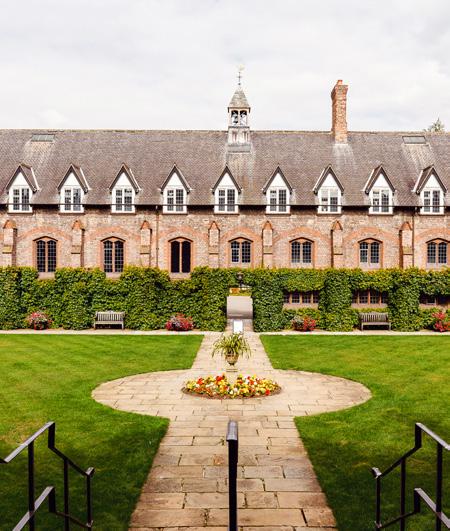
Firdes Ali
that can positively impact children’s lives and educational experiences around the world.
I’d really encourage other PGRs to explore the PGR Conference Fund to attend similar events in their own fields. Conferences like these are not only academically enriching, they’re also a powerful reminder of why we do what we do. And the funding team supported me every step of the way (even helping me switch hotels so I could alongside my supervisors, even after I had booked a hotel elsewhere!).
It’s a fantastic opportunity to grow your confidence, receive thoughtful feedback, and gain further insight into the world of academia, beyond the lecture halls! And the PGR funding helps make it all possible.
The actual conference itself was completely fantastic; the topic was on a really similar theme to my research topic and so there were so many panels that were useful for my research and also just really interesting to me. I got so many recommendations for things to watch and read and listen to for my research! While it obviously wasn’t the main focus of the conference, there was a really good social side too that helped me get to know a lot of people in my field of study. I met some fantastic people, some of whose work I had been reading a lot of for my research, so I got to talk with them about how my research interacted with theirs, which was scary but also really useful for thinking about my own research. There was also a large group from the hauntology research group from YSJ at the conference so I knew a lot of people, and made some really good friends there who I have since been in contact with to discuss various research things and we share opportunities with each other that we all might be interested in.
Overall, I would definitely recommend getting out there and going to as many conferences as you can (within reason - don’t do what I did and do them back to back if you’re presenting different papers! You can present the same paper at different conferences though if you reckon it’ll be a different audience that’s fine), especially if it’s really aligned with your research topic, as it’s a great chance to meet other people researching similar things to you. I hate the idea of ‘networking’ but just chatting to people in the pub after the conference about how much I enjoyed their presentations wasn’t nearly as painful as I thought it would be and I had some really interesting conversations with people that have inspired different areas of my research.
It was a privilege to participate in the 2025 Summer School hosted by the Universities of Leicester and the West Indies and present my study in such a prestigious international academic environment. It was a great opportunity to network with academics from other fields and cultures.
Presenting my work in this setting enabled me to refine my arguments, respond to thoughtful and challenging questions, and reflect on how my research is received in an international context. The feedback I received during my presentation has been crucial in shaping the next stages of my project.
Talking about my findings to a diverse group has strengthened my academic confidence and presentation skills. Also, I was able to make some new connections at the conference that could lead to some potential collaborations in the future.
I am grateful to my university for the opportunity to participate and for the support that made this experience possible.
Luciana Lisboa White
I thoroughly enjoyed going to the BPS Division of Education and Childhood Psychology Conference in January. I was accepted for an oral presentation, and I talked to an audience of approximately 30 people in one of the many parallel sessions they had on offer.
One of the good things about presenting in a conference is that you have a time limit to present your work, which makes you focus on the most important points of your research. This was a good opportunity to review all the work I had done and to condense the most important points. It was also a good chance to think of ways in which to communicate my findings in a simple and appealing way. I was lucky to present to an engaged audience, and once the presentation was done, people were interested in some of the challenges I had faced to complete the study. The conversation that started in the presentation room, continued during coffee breaks and lunch. People approached me wanting to know more about the work I am doing, which was reassuring.
The conference was a good opportunity to connect with other academics and PhD students from different universities. It was good to hear about other people’s projects and to find common ground. A couple of the keynote speakers were truly inspirational, and it was useful to watch smaller presentations and learn different ways in which academic work can be presented.
Above all, I think that going to this conference gave me a much-needed break from my desk and made me broaden my focus from my research to wider contexts. I came back full of energy and inspired to continue my work and looking forward to going to the next conference!
Zoe Keating
The conference I attended was the Society for Utopian Studies Conference 2024 in Tulum Mexico, it was an incredibly supportive environment with a majority of the attendees being PGRs. I presented in one of the first panel blocks, meaning I didn’t have to sit in the nerves of presenting and got it done quickly. My fellow panellists were interesting and supportive; we each asked the others questions and continued our conversation outside of the panel. The PGR community was quickly pulled together as we explored different places for lunch and assuaged each other’s fears and nerves for their upcoming papers. It was so much fun to spend time with people in the same academic position as me, in a variety of stages of their careers, and I am still in contact with the people I met there, both in a professional and personal context, offering peer review and online support despite the time differences. As well as the PGR connections, I spent time networking with some of the established academics and even connected with someone who offered to be a part of my Viva. They were all accepting and welcoming to the PGRs and made time to answer questions about wider academic careers that some of the group had. I was able to support the conference by attending the registration table for a period of the conference, and was therefore able to reach out to people I might have missed during the other panels. Overall, it was an amazing experience that I would take up again without hesitation, and have since attended many more conferences using the skills and advice picked up from this experience and accepted many more networking opportunities.
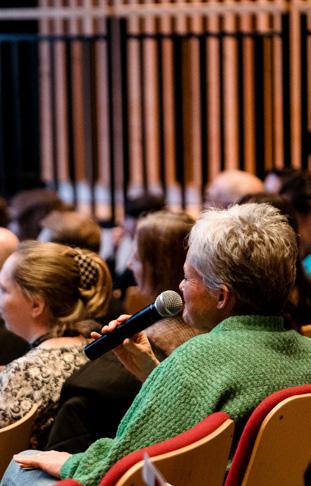
Attending the BACP Annual International Research Conference (15-17 May 2025) was a very enjoyable experience. Actually, having my abstract to present at the event accepted, without editing, was just the motivating factor I needed and very encouraging. As a presenter it helped me to realize that my research project had indeed enhanced my knowledge, and this has enabled me to face the feeling of ‘imposter syndrome’ and actually grow in confidence. Although I was quite apprehensive at presenting to my peers, the feedback I received was encouraging and questions presented to me were ‘food for thought’ moving forward in my final year of study. Listening to other presenters and networking over coffee made it a rich learning experience and I have enjoyed sharing a new peer network since. It was an event full of rich research projects to debate, and I thoroughly enjoyed the whole event. As a PGR, with all of the financial constraints this poses, I would strongly recommend applying for funding, as an experience such as this can be very fruitful for all parties involved
Rory
Wells
I applied for the YSJU Conference Fund in 2024 to attend the 1st Music Education and Community Music Conference at the University of Macedonia, Thessaloniki, Greece.
The fund was simple to apply for and I was well supported through the application by YJSU staff. The fund covered my travel, accommodation and subsistence for the 4 days I spent in Greece. Without the fund I would not have been able to access this conference. Being there was a fantastic opportunity to be part of the conversation of an emerging cite of scholarship in my field. I made fantastic new connections, built on connections established through the conference’s organisers attendance at York St John University conferences I helped to organised, and reconnected with international colleagues met at other international conferences.
Being able to access such spaces and make these connections has been invaluable to my PhD journey, my professional networks and added great enrichment to my studies as a whole. I would recommend any PGR thinking about attending a conference that might be out of their reach to attend otherwise to apply for this fund!
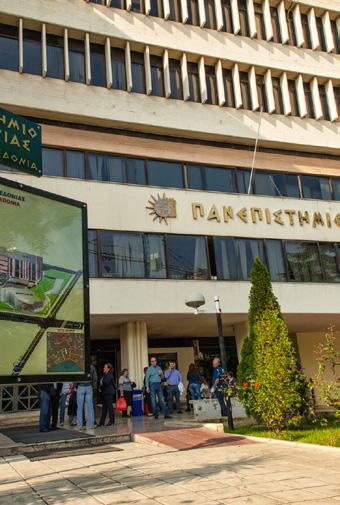
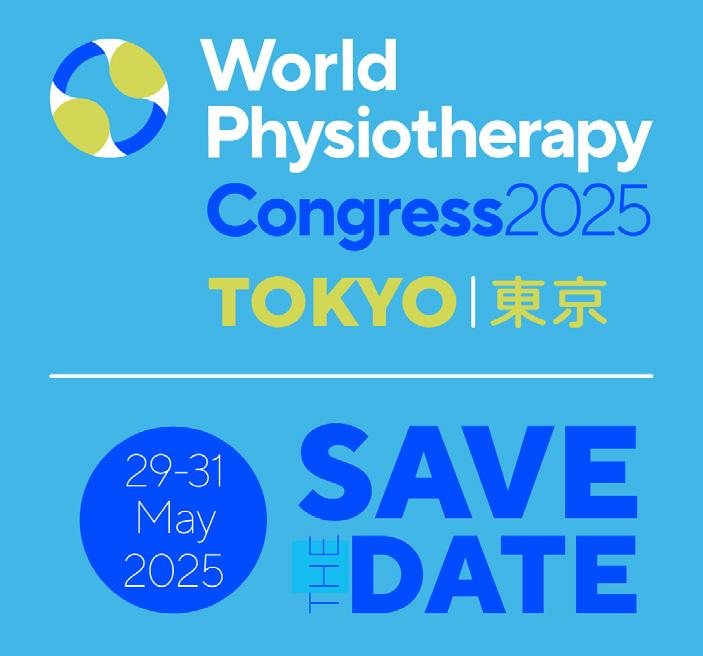
I am very grateful to York St John University for funding my attendance at the World Physiotherapy Conference in Tokyo. The conference programme was outstandingly broad and well curated: I was able to attend multiple musculoskeletal sessions directly relevant to my research and field of work yet still found there was far more high-quality content than time allowed—a testament to the event’s scope. If other PGR’s were considering it, they should, I’m confident there would be something for everyone.
Presenting my poster was an invaluable learning experience: I gained practical insights into how a large-scale international conference is organised, honed my skills in distilling complex data into clear visual form, and have already resolved to apply for a podium presentation next time. Equally rewarding was the networking: I received excellent guidance on overcoming specific PhD challenges, explored potential post-doctoral pathways, and even opened conversations that could lead to NIHR-linked projects later this year. I also gained a real appreciation that listening to others present, and asking questions about their research was an enriching as presenting your own. As an early career researcher this is the part where you have direct access to some of the best researchers in the world, and you can learn a lot if you approach it with curiosity. People are more than willing to discuss their work, and offer you guidance.
Beyond the professional benefits, experiencing Japan’s culture firsthand was fantastic. From the efficiency of the transport system to the warmth of local hospitality, it was a fantastic opportunity both academically and personally. Thank you again for making this trip possible—it has already had a tangible impact on my research trajectory and professional development.
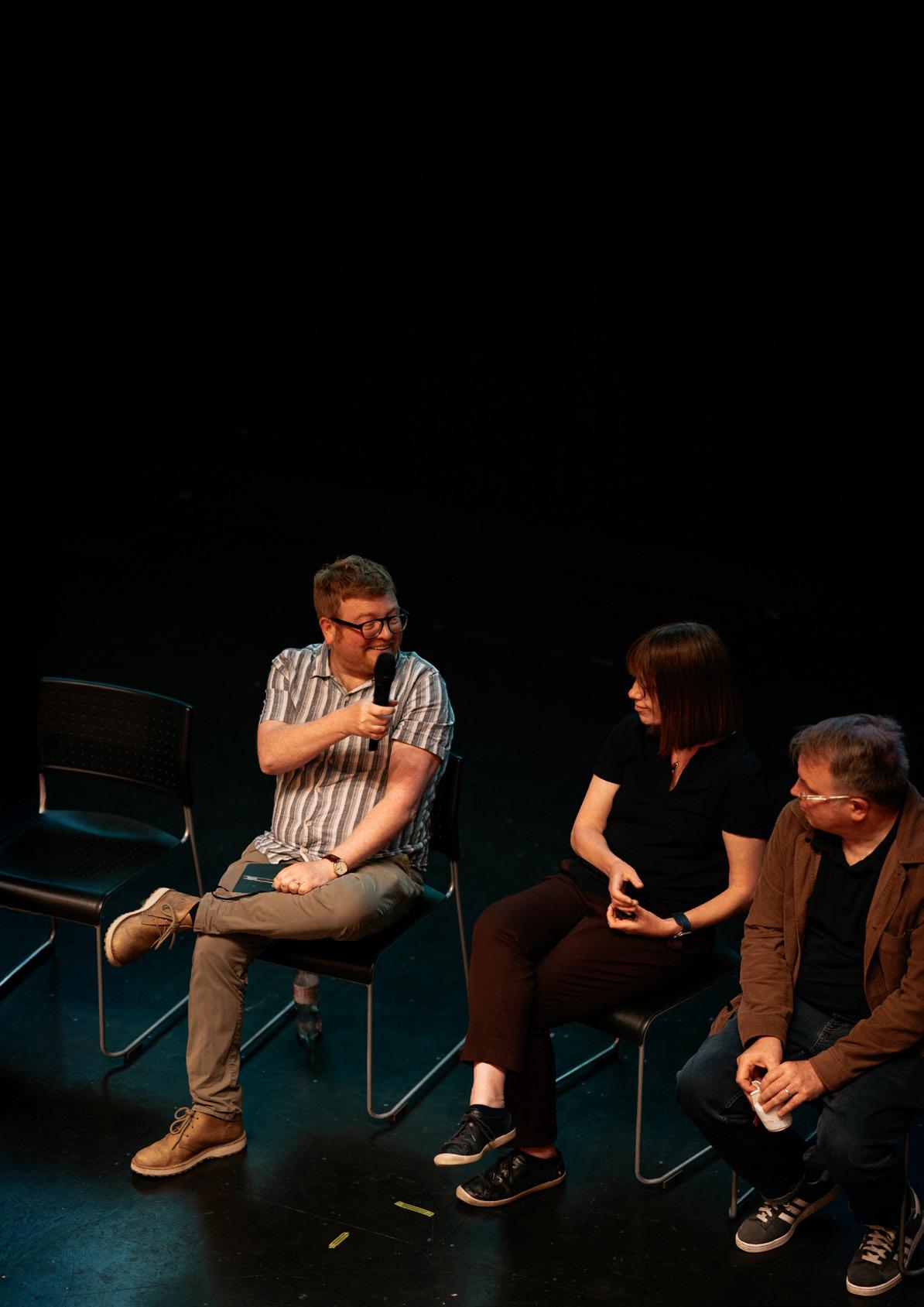
In June 2025, York St John University proudly hosted its first-ever PGR Careers Symposium—a vibrant, full-day event designed to support postgraduate researchers in exploring career paths beyond the research degree.
The symposium brought together voices from across the university, including a Keynote speech from Professor Helen Minors, Head of School for the School of Arts, and a workshop from Dr Holly Prescott , PhD/ECR Researcher Careers Specialist Practitioner and creator of the acclaimed Postgradual blog.
Through a series of talks and discussions, attendees were invited to reflect on their aspirations, hear real-life career stories, and gain practical insights into transitioning from academia into a wide range of professional fields.
Speakers shared candid accounts of their journeys, highlighting the unexpected opportunities that shaped their careers. Whether attendees were considering roles in academia, industry, or the third sector, the message was clear: there is no single path, and every journey is valid.
The day culminated in a compelling Alumni Panel and Career Discussion, hosted in collaboration with the YSJ Careers team. The panel featured YSJ PhD alumni who have continued their careers within the university, offering a unique perspective on life after doctoral study.
Guided by thoughtful questions from the Careers team, the discussion explored the audience’s current career ideas and long-term goals. As the conversation unfolded, a powerful theme emerged: resilience in the face of change
Dr Rob O’Connor, Senior Lecturer in Creative Writing and Creative Industries, emphasized the importance of readiness and adaptability:
“Make sure you’re in the right position when opportunities arise.”
He acknowledged the role of chance in career development, but stressed the need to be prepared to act:
“There’s a certain element of luck, but you need to be in a position where you can take those moments and make the most of them.”
Dr O’Connor also challenged conventional views of career progression:
“People see the career path as a straight arrow, but it’s tied up in a knot. Seeing it as an arrow can be detrimental.”
Ruth Morris, Graduate Success Coach in Student Success and Learning Services,
introduced the concept of “planned happenstance”—a career theory that encourages openness to unexpected events and opportunities, rather than rigid planning.
The panel later turned its attention to the PhD itself, prompting deeper reflection on motivation and purpose. Dr O’Connor posed a thoughtprovoking question:
“Why do you want to do it (the PhD)? What is your endgame?”
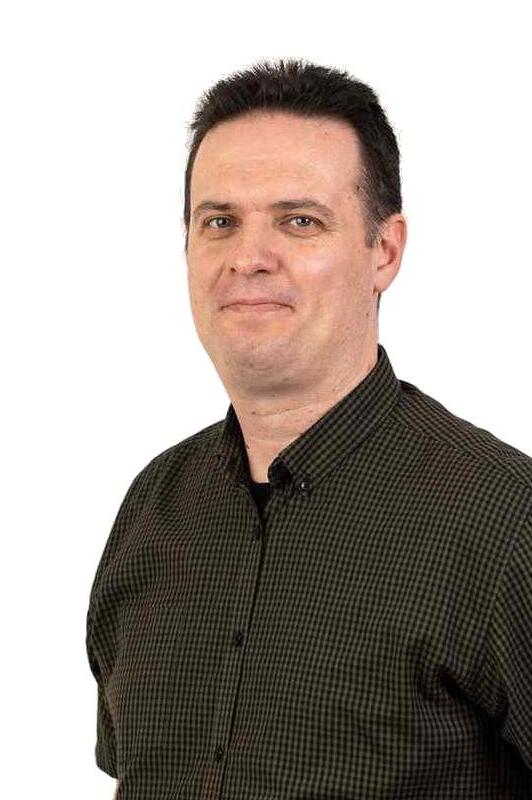
worth beyond academic aspirations
In the following section, we hear directly from three of our speakers as they share personal reflections on their career paths—offering insight, inspiration, and honest accounts of the choices and challenges that shaped their professional lives.
‘Throw
the map’ and explore
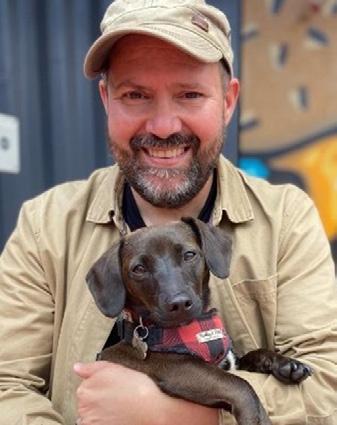
I started my PhD relatively late. By my mid-30s, I’d been teaching at a Further Education (FE) college in North London for the best part of a decade and honestly thought my days of university were behind me. I’d completed a Postgraduate Certificate in Education (PGCE) at the University of Greenwich and handing in my final portfolio felt triumphant. No more coursework, no more queuing for the photocopier, no more worrying about jobs at the end of the course. What I didn’t realise is that I would miss the work itself. It turns out that research and new ideas are sort of addictive.
So when, in 2010, a new government arrived and promised to slash public spending, this seemed an opportune
moment to walk away from FE and start a new chapter at York St John. Starting the PhD was really challenging.
I had two quite serious health scares in rapid succession which disrupted by first two years of research significantly. Thankfully, my supervisor was sympathetic and helped me with all of the necessary admin involved in suspending study. Aside from health issues, the transition to being a doctoral candidate itself was hard. I was used to a very structured day that was governed by a timetable. I was used to being a senior member of staff. Now I had no real structure and was at the bottom of the pile with a big dose of imposter syndrome (although this never really goes away). Again, support from my supervisor and the healing properties of time and graft helped out.
Since my MA, I had maintained a keen interest in American literature (my writerly hero Kurt Vonnegut especially) and felt like I might have something to say. The problem was that the leap from interest to scholarship was huge. I was faced with a whole new set of critical ideas and terms (people kept saying ‘methodology’ as if this meant something to me) and the quick realisation that I had taken on a much more significant task than I first imagined. After a few months
though, this became a positive. The PhD is about filling those open spaces. You assume that you are supposed to know the answers before you start but it’s the opposite in fact. The stuff you don’t know is empowering; it means that there is a gap you can explore and new knowledge you can produce. So, imposter syndrome is probably a good thing. It actually means you are open to learning and prepared to, in the words of Ursula le Guin, ‘throw away the map’ and explore.
The experience changed significantly when I started getting involved with teaching on the literature degree. The ideas I had been developing in my research made much more sense in the seminar room. I could draw on my experience as a teacher and reflect on what this meant in a new environment. I regained a little of that structure that I had been missing. My PhD work was no longer in the abstract and could be bounced around discussion activities. Above all, I loved the teaching environment. I am and always will be a teacher before anything else and keeping this in mind meant that the slog of a doctoral thesis continued to be worth the effort.
Dr Lauren Stephenson, Senior Lecturer in Film and Media and Communications
As a PGR, one of the most valuable things I learned was how to approach my research and professional goals with an open and creative mind. Finding academic work during, and particularly after, the PhD can be challenging. Maintaining a focus on what motivates you about your research, and what drives your aspirations in academia, can allow you to identify opportunities outside of conventional academic careers, even if just for the short term. Having struggled to find an academic position in the months following my PhD submission, I was encouraged to think a little more unconventionally about opportunities and careers outside
of academia that still allowed me to pursue the things that had motivated and driven me throughout the PhD.
For me, teaching and learning was that driving factor, and so I was fortunate to find opportunities in guest speaking, charity partnerships and widening participation initiatives which enabled me to develop my teaching experience and grow my confidence. Working outside of academia postPhD in a number of different roles also allowed me to maintain a sense of self and identity which incorporated, but wasn’t wholly defined by, academic aspirations. In terms of maintaining a sense of worth as a PGR and an early
My PhD journey – ‘resilience, resilience and resilience’.
Dr Mark Mierzwinski, Senior Lecturer in Sociology of Sport
When starting my part-time PhD whilst working full-time, my supervisor joked, “don’t buy a house, get married and start a family until completion” – I did all, and more! The quip was made knowing I would likely be embarking on such life changing experiences. The point was that life complexities will do doubt impact your PhD and your PhD should take over your life, but your PhD will become a significant part of your life until completion.
Another memorable quote given to me was, “A PhD is 1% inspiration and 99% perspiration”. I certainly found this to be the case. I frequently questioned if my inspiration and perspiration was good enough. The point being is that imposter syndrome, demoralising experiences and set-backs are frequently experiences of the PhD process. Finding a way to circumvent, manage and overcome such feelings and experiences tests and builds resilience, life lessons not documented in your thesis.
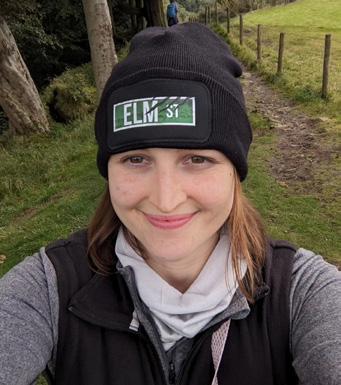
career researcher, understanding that the PhD – and the skills and experiences I had gained as a PGR – opened many doors to interesting jobs and opportunities both within and outside of academia was invaluable.
Resilience gained stood me in good stead when encountering the PhD submission-viva-completion process. The sense of self-realisation, achievement and pride gained from receiving a PhD at graduation has few equals, making all the perspiration worthwhile. Resilience is also transferable and certainly helped my process and deal with the Covid pandemic much better, as well as managing the changes to academia.
Working as a lecturer, I was already in academia when completing my PhD. However, the sector has changed over the last decade. Having a PhD definitely enables me to be a better lecturer, become more research active and experience new opportunities. Indeed, unlike when I started, a completed PhD is now a prerequisite to be shortlisted for interview for many lecturing posts in Higher Education. Furthermore, to be successful in
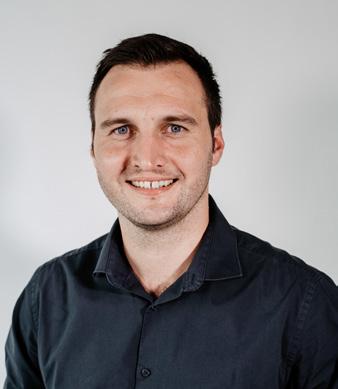
interview may likely require some level of teaching experience/qualification, and evidence of research publications. Be mindful of such sector demands when completing your PhD and deciding whether to pursue various opportunities presented. Finally, would I recommend academia as a possible career route – absolutely. It offers much satisfaction, personal rewards, good pay and many feelings of selfworth and purpose.
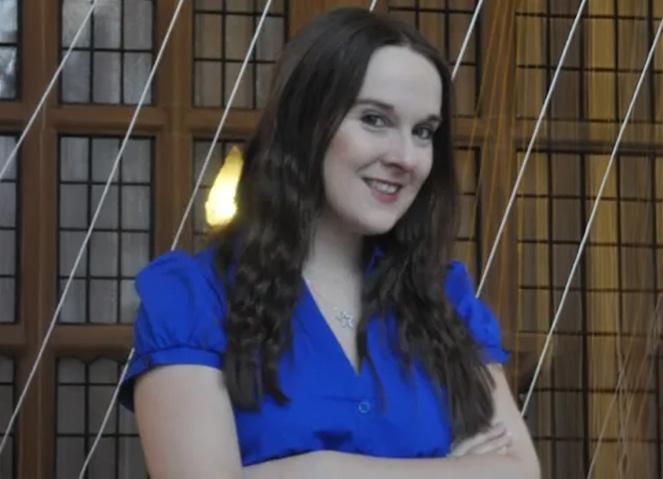
Career paths in academia and research are not one-sizefits-all. For PGRs and post-doctoral researchers, the journey can be full of unexpected turns, big decisions, and plenty of questions. To unpack some of that complexity, Amy and Richard from the PGR School met with Dr Holly Prescott—a PhD graduate and careers specialist whose work helps researchers to figure out what comes next.
Dr Prescott completed her PhD at the University of Birmingham in 2011, subsequently working in postgraduate recruitment before undertaking a professional qualification in career guidance (PGDip). Since 2015, she has been an accredited careers adviser, specialising in helping PhD researchers explore career options both within and beyond academia. Through her role as PGR Careers Adviser at Birmingham and her work as an external trainer across numerous institutions and professional associations, she has supported thousands of researchers in building confidence and clarity around their next steps.
In 2021, Dr Prescott launched PostGradual, a blog dedicated to addressing the most pressing questions surrounding post-PhD careers. The platform has since attracted over 70,000 unique readers from more than 140 countries, reflecting the global relevance of her insights. Her forthcoming book, Navigating Careers Beyond Academia: A Practical Handbook for Doctoral and Postdoctoral Researchers, is set to be published by Routledge in 2026.
Throughout the interview, Dr Prescott offers thoughtful reflections, practical strategies, and evidence-based advice for researchers navigating career uncertainty. Whether embarking on a doctoral journey or preparing for life after postdoc, her perspective serves as a valuable guide for those seeking meaningful and sustainable career paths in— and beyond—academia.
Amy: Hi Holly! Thank you so much for joining us today. Let’s get straight into it. How did the PostGradual blog come about?
Holly: I started the PostGradual blog in 2021, and it was that long lockdown of winter that went from the end of December all the way through that winter in 2021. I’d had the idea to start a blog for a while and I had been working with postgraduate researchers for probably about 5-6 years at that point, helping them with working out their next steps, and I realised a lot of recurring questions kept coming up that went way beyond practical stuff like ‘how do I adapt my CV for industry’, which seemed to be a focus of a lot of post PhD careers advice that was out there at the time. So, I thought, well, I’m thinking of writing, I’m thinking of doing a blog, why not do one that tackles some of the most common and head scratching issues about moving on after a PhD? And that was what PostGradual became.
As well as being designed to help PGRs and ECRs , with the frameworks and the tips that are included, I also wanted it to help other careers advisors who worked with researchers because sometimes it’s only a tiny part of their job. They don’t have lots of time to dedicate to the researchers, so I thought if they’ve got this free resource with frameworks and models that were working for PGRs in my practice, then it would give them a go-to tool kit as well.
Richard: Is there anything that you’ve learned from doing a PhD that you feel has informed your career development?
Holly: I would say a lot. I think both the general experience of having done the PhD, but also maybe the specific skills I got from it.
Just to acknowledge, first of all, I finished my PhD in 2011. I acknowledge that it was a very different time back then and I don’t really find it appropriate to say “Here’s how I managed life after my PhD. You can do it in the same way too!”, because it’s a very different political and economic situation that people are in now, so I just want to acknowledge that!
I would say I was lucky. About my second year of the PhD, I realised that I really loved working in a university environment. I really loved doing things that were student facing, but I wasn’t that fussed for that to necessarily be linked to my research area or my subject area; I was very up for exploring what else a student-facing career could look like. What I did was I made the most of being in a university environment, such as investigating and meeting people across the university, finding out what their roles were. I used to go to loads of training sessions, not necessarily for the training, but just so I could say hello to the trainer at the end and ask them about how they got their job and
how they found it. I used it as a bit of a research project really, and I also thought about, during my PhD, what kinds of activities am I tending to seek out and say yes to? And they were things like teaching anddeveloping resources, notnecessarily research (which I felt guilty about at the time) but that was actually telling me something important about what captured my energy and what bits of myself I wanted to be using.
I used my PhD time then to just do little bits of work: I picked up quite a few bitty jobs at my university just to try things out, working in postgrad recruitment as a student ambassador and that actually led to my first job after the PhD. I just used it to be curious, make the most of the people that were around me.
Also, I would say that working in career guidance is not completely different from studying English literature, which is what my PhD was in. When you study literature, you’re analysing stories and narratives and when I’m sat with a PGR, listening to where they’re coming from, the challenges they’ve had and where they want to go, it’s another kind of narrative analysis, looking for the messages, and understanding and interpreting that, and I think a lot of those skills come from interpreting literature as well. This is something that I say to a lot of PGRs: there can be a lot of unexpected crossovers you’ll find between your discipline and what you’ll go on to next, which you might not have thought of beforehand, but they are there.
Read Holly’s blog post here:
Amy: What advice would you have for someone who is in the midst of a PhD? Especially those who are worried about their future careers?
Holly: Where do you start with that?! [Holly laughs].
Amy: It’s a big question!
Holly: It is a big question, but I think that’s a lot of people’s problem, right? Where do you even start with something that feels so big?
First of all, I try and ground people a little bit and say, if you’re worried about something, especially if you’re worried about something in the future, something that’s not quite imminent, it can be even easier to keep putting it off. If it feels daunting, then it can be even more tempting to keep putting it off, not think about it. The first thing I would say to people (and this sounds really easy for me to say, but difficult in practise), is try and make friends with that worry a little bit.
What I mean by that is if you’re worried about something, you’re worried about your future or what’s next, try to acknowledge that and make that a motivator for action rather than something that’s going to push you into denial. I think one of the most useful things you can do is start early, because if you start early, you can break your next steps down.
So, you’re a PGR, you’re a researcher – think of it like a research project.
If you think about a research project early on in your master’s or your PhD, you might do a lit review. You start by understanding what’s already been done and what you want to do within that. Then you start planning your research, doing your experiments or analysis, and then you write up.
You wouldn’t try and do all those things in the last three months of your research degree, would you? So, you shouldn’t try and do all those things in the last three months when about it comes to careers as well, because if you break it down, think: a literature review, what’s the career equivalent of that? It’s probably things like finding out what other PGRs have gone on to do. Find out how they found their journeys. Your actual research or experiments, what’s the equivalent of that? It’s trying things out. Small, low risk things you can do to understand what you want to do or what you don’t want to do.
You wouldn’t try and cram all of those steps into the last few months, so don’t do that in the career sense either. Think about your next steps as a research project with those different steps to it, and I think that it’s important to start early.
What I say to people is that you can’t know that something’s a good opportunity if you’re not looking for it. If you know what you’re looking for, how you want to develop, and what you want to do more of, then it’s easier to understand what to say yes to while you’re going through the PhD. You can only recognise something as a good opportunity if you know you’re looking for it.
So, if you start to think about this early, using something like your development needs analysis and thinking about the skills you’ve got and skills you want to gain, and think about possible next steps early on, then you’ll be better able to spot opportunities when they come up, and by the end will hopefully have more experience under your belt for types of roles or types of careers that that you might enjoy.
Amy: That’s a really interesting answer. Thank you, Holly. I really like the bit where you said make friends with your worry.
Holly: Yeah, when a worry pops up you can apply the principle from CBT, treating thoughts as thoughts. And that’s all they are. So, when a worry pops up, you say, “Oh, hello, where did you come from? Why are you there?”, and have a conversation with it. That’s another way of doing it. Writing it down is another.
It sounds easy to do, but I think it’s something that you’ve got to practise for good mental health and for getting through your research degree anyway. I think it is an important life skill to try and get to grips with.
Richard: How would you approach advising someone who is torn between academia and a different path?
Holly: This is a really common question. One of the first things I tried to do any time anybody presents a binary to me, like “I’m trying to decide between this or that”, I question whether it HAS to be an either-or? That dichotomy of either you stay in or leave academia.
From what I see, that’s not necessarily how it works. There are lots of ways that you can work that combine both. In my book, I’ve got case studies of people who are balancing parttime, academic teaching or research with something else. People in roles that work between academia and beyond. So, the first thing I think is understanding that a lot of these things are not absolute. It doesn’t necessarily have to be either-or.
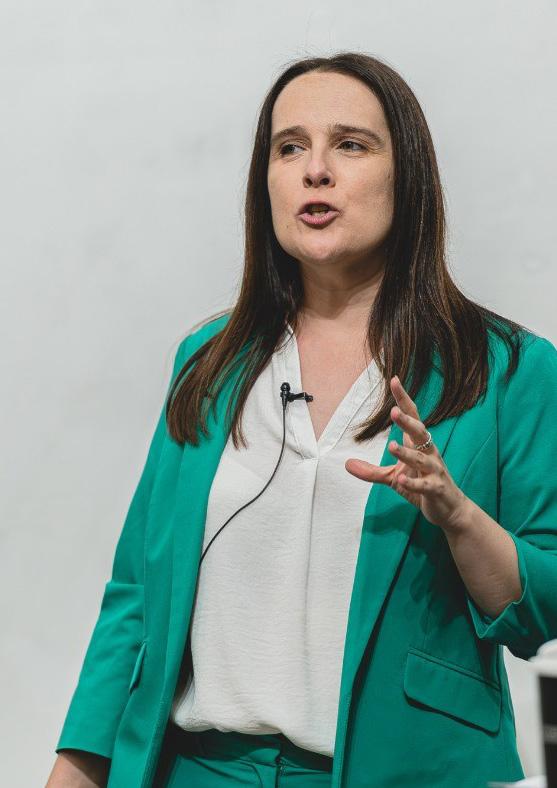

For example, a lot of people struggle with this decision because they put loads of pressure on themselves to make the right choice, pick the right path and that assumes a lot of things. Firstly, it that there’s a right and wrong way to do your career, and I don’t think there always is. I don’t think necessarily if you choose this one thing, you’ll be happy. And if you choose any of the others, you won’t.
I don’t necessarily think it works like that and thinking like that can be counterproductive because it leads people to think “If I leave academia, I’ve got to make the right decision” and they put pressure on themselves which can have the opposite effect and mean that they do nothing. They just drift or stay where they are and get stuck.
The idea of career path is quite outdated now. Jobs for life and linear careers are more unusual these days. An example of how I would approach this, for people at that junction, thinking “Do I go down this route or that route?” and putting a lot of pressure on making a decision is to try and think about a previous decision you’ve made. There’s a PGR I worked with about a year ago now; she’d done an internship in her PhD, and she had no problem deciding what internship to do, but when it came to deciding what kind of job to apply for, she really struggled with it. She approached it like “now I’ve got to decide what to do with my life”. We asked, “How did you make the decision about the internship?” and she said, “That wasn’t what I needed to do with my life, that was just deciding what was my next exciting project.”
So, why not approach your next step in the same way? Let’s not think about it as you’re choosing a life or you’re having to make the right decision. Let’s break it down and think: What’s your next exciting project and what do you want to gain from that? Rather than saying: what are you going to do with your life?
If you have things you like about academia and want to take with you from academia, think about what kinds of roles will let you do that. Where else you can apply those things? It might be in academia; it might not be. It might be that you can combine academic work with other kinds of work, but don’t think that a career is something that results from this one irrevocable, one-off decision because it’s too much pressure to approach it like that.
Richard: I think it’s very healthy for people to hear that an all or nothing mentality is not the way to deal with these sorts of things.
Holly: Yeah, absolutely, and I think that if you’re thinking about whether you want to stay in academia, what’s the drive to do that? If it’s that you want to have a particular kind of impact, explore other ways you can have that impact.
It might not be through trying to find a permanent academic job, it might be through post-doc funding, it might be through collaborating with a charity or public sector, or it might look like something different. Think about what’s the motivation, what is the impact you want to have and think about the different ways you can do that because full time academia is absolutely not the only way that you can have an impact.
For some people who do a research degree, they’ve maybe been good students and been told “you could progress with this.” What I try and get PGRs to understand is that the transition from student to academic is that you stop being a learner, as in someone who learns knowledge, and you start becoming someone who creates knowledge. The PhD is a first step in that.
It’s almost like you’ve got to be your own business, in a way. Your work, your ideas - that’s like your own business and you’ve got to find your own way of funding that, bringing it to people, bringing it to an audience, getting people invested in it like you would if you are pitching a start-up business. So PGRs might see their lecturers as having a cool academic life, but don’t see all that working behind the scenes of just how much ownership and leadership you’ve got to take over your ideas if you want to really progress them. I thought that’s something worth mentioning, and something that if you’ve just come straight through, for example like undergrad, Masters, PhD, you might not have seen that side of academia.
Amy: I was reading your blog, and I saw that after you finished your PhD, you were wondering ‘what career am I going to do,’ and I read the bit about crying in a bar over an espresso martini, feeling like no one was going to hire you.
Holly: It’s funny that crying into an espresso martini is probably one of the most common things that people talk to me about, “Yeah, I’m Holly and I cry into cocktails!”. I still remember, it’s so vivid. I remember which bar I was in. I remember where I was sitting. It was one of those memories that is very emotional and it’s still very much there. But I do go back to that bar every so often, and I remember how different things are now. If it was a film and ‘old me’ was there in that bar and ‘new me’ is there as well, I can go to her and say it’s going to be Ok!
Amy: If you could go back to that Holly, Post PhD, would you choose a different path or a different career journey, or is there any advice that you would give her knowing what you know now? Are you happy with the path that you’ve chosen?
Holly: Honestly, the short version is no, I don’t think I would have chosen something else. However, that’s not that I don’t acknowledge that there are probably a lot of other things I could have done and in those parallel universes I might have been just as satisfied as I am in this one. I would have been satisfied as long as I was working towards a mission that I cared about, I was contributing to scholarship in that field, and I was creating a profile in that field. I think whatever I’d have chosen, if it let me do those things, I’d have been happy. So now, I get invited to do talks and things like this, I’m writing a book but none of it’s about contemporary English lit, which is what my PhD was in. I think as long as what I’d chosen had let me do those things, I would have been happy. So no, I wouldn’t have chosen something else, but I chose something, and I just owned it.
I think that experience of being a researcher, it helps you do that because you’ve got to, in a lot of cases, design your project and own it. I know that for some people, some career decisions require investment. For me, going down the career guidance route, I had to pay for and do a professional qualification in my own time, and I know that’s not easy for people. You feel like you need to make the right decision before you go spending time and money on things like extra qualifications, but what I stand by is the fact that, out of the PhD, I took a sort of interim role. I had a part time job at the university that led into a full time one in postgraduate recruitment which let me do some of the things I wanted, working professional services in a university, get a bit of experience, but I knew it wasn’t what I wanted to do forever.
I stand by the decision of doing that for a bit, using that to learn where I might want to be, so that by the time I invested in my path, I was pretty sure that it would give me what I wanted. I think it was not feeling the pressure to get it right, get it perfect with my first job, giving myself time to do something, work it out.
A lot of my academic research was in English literature, but it was also cultural geography. I looked at a lot of representations of urban spaces, particularly liminal spaces, places that are sort of ‘not this or they’re not that’, they’re in between. I would say to my old self that the feeling of being liminal when you finish the PhD can get better. It’s really tough having been known for something, like being known for a research area and being able to say “I’m a cultural geographer” to then not feeling like you can say that anymore, and not knowing how to describe what you are.
You might end up doing a job that’s a bit more nebulous, and it’s hard to say, “I’m an X, right?”, but what I would say is that it will get better. You will find your new niche; you will be able to say, “I’m Holly, I’m the PhD careers person”. You will have an identity, and it will fit you. I think the key is to find something you can keep, something you can own, something you can get to grips with like you got to grips with your research, and that’s what I’ve done with PhD careers. That’s what I would tell her, if that effigy of ‘old me’ ever turned up in that bar when I was there. You might feel ‘in-between’ now, you might not know how to say what or who you are now, but that will come.
Richard: Can you think of any skills, tactics or techniques that would help PGRs out in life in general, not just in a research career?
Holly: Yeah, great question. There’s one obvious thing I’ll talk about first. The first thing to talk about [in what skills to develop], is that we have to acknowledge AI. A lot of what I’m hearing, and this is from employers and some of the podcasts I listen to, is that your job might not be taken by AI, but it might be taken by a person with AI skills.
Whatever it is that you might want to go into, whatever industry sector you’re interested in, just take a bit of time (even if you don’t think you’re very ‘tech-minded’) to understand how is AI impacting that sector and how is it being used, because I think it’s something that’s coming up more and more in interviews. Just be aware of technological changes, not necessarily just AI, that are impacting and being used in the sector you want to go into, I think that is really important.
I think the next thing I would say is less about specific skills and it’s more about encouraging PGRs to develop as much tangible evidence as you can that you can do certain things. This is a good one if you want to avoid coming across to employers as being “too academic” or “too overqualified” or “too niche”. A lot of research that I’ve done for the book and elsewhere has shown that some employers do have reservations about hiring people with higher degrees because they’re unsure whether somebody who’s done something like a PhD, for example, are just interested in doing their own thing? Are they quite blinkered? Are they quite narrow in their focus?
So, do what you can to develop as much evidence as you can that you can work with others towards a shared goal, that you can collaborate, you’re not just interested in your research agenda, you can work with others towards a shared goal because academia is becoming more collaborative. If you go into industry or another sector, you’re going to have to work with others. Build evidence you can work with others towards a shared goal. Build evidence that you can make decisions without having the perfect data, that you can make decisions that have a positive impact on other people, not just your own research or your own project. Try and get evidence that you can do things that have an impact wider than just your own progress in your research. Build evidence to show that you can adapt to different ways of working, that you can adapt to different paces of working, because if you can do these things and you can prove you can do these things, then that will help to reassure employers that you’re not just a subject specialist who doesn’t know how to do
anything else. You are adaptable, you can work with others, you can help employers to achieve their goals.
The other thing I wanted to talk about is grant writing or bid writing. We’re in an economy now where people are fighting for resources, whether that’s in academia, whether you work in the private sector and you’re wanting to win business, or you work in the charity sector and you’re fighting over funding and fundraising. If you can bid for little pots of money and show that you can do that, that’s useful: not just in academia, but beyond as well, because that’s showing that you can win investment. That’s attractive to employers because that’s evidence you can go out there and you can win bids, bring in new business. In the climate we’re in, that can be useful and is very transferable from academia to all the sectors as well.
One last thing that’s important, don’t neglect developing the skills to take care of yourself. We’ve already talked about the ‘saying hello to your worry’, talking to it, making friends with it, but self-management is such an important skill throughout something difficult like a research degree, and beyond. Understand the things that keep you sane and keep you balanced and practise making sure you’ve got the time to do those things and build them into your routine. I know when you get busy and when you get stressed is when you’re more most likely to drop those things, but it’s actually the time when you need them the most. You need perspective. You need to look after yourself, so you understand what you need. Attaching your identity and sense of self to what you’ve been doing can mean that when you get job rejections, you can take it very personally. Practise detaching your self-worth to things like the outcome of applications or bids. Managing yourself, taking care of yourself and still trying to prioritise those things, even if everything around you feel like it’s on fire, that’s when it’s most important.
Amy: Thank you, Holly. Just going back to grant writing, we’ve recently started promoting the Alternative Guide to Postgraduate Funding, because a lot of our PGRs come to us asking if they can apply for grants. There are so many things that are available, even just small bids. It’s good to get that practice in because that is a big part of academia.
Holly: Yes, I was talking to a PGR yesterday actually, and she wasn’t sure what to do next. She wanted maybe to carry on with research but wanted to do something more applied as well and she said her ideal job would have been going into something where she could try lots of things out and then make a decision. We sort of built her own graduate scheme. She could apply for these pots of funding and she’s going to apply for funding for a Lab visit and go to a different institution, and she’s going to apply for a short internship and get some funding to cover that, too. The benefit of that is whatever you want to do next, you’ve tried those things out and you’ve got a funding/awards section for your CV, ready-made. It’s a win-win.
There’s something interesting that I was talking to an academic about recently, with what’s happening in the US with research and programmes being pulled there. It means researchers from the UK are more in competition with researchers from the US for jobs here in this country. The researchers from the US, because the PhD is a lot longer, they tend to have more experience of drawing funding. In UK institutions we have to try to give our researchers every opportunity they can to evidence that they can win funding.
Amy: Before we go, I just wanted to ask are you able to talk a little bit about your book that you’re writing?
Holly: That’s a journey as well! I did a blog post about it because I think that when you work in professional services, you’re a bit excluded from access to all that business! I blogged about how I got the contract and as I’ve been writing the blog and I’ve been developing frameworks and exercises and things that I think really work with PGRs, I thought if I was going to lay this out like a sequence or like a programme that people could follow, I could do that. And when I did , it ended up forming a book proposal and breaking up quite nicely into chapters. I got a no from the first publisher that I approached, and as I say rejections are important, the feedback was so useful because then I knew what different type of publisher to approach the next time, and they said yes.
It’s called Navigating Careers Beyond Academia: A Practical Handbook for Doctoral and Post-doctoral Researchers It is a step-by-step guide, and each chapter talks through the things that we’ve mentioned, dealing with things like the emotional transition and the psychological barriers that you might face, then going through to actually understanding who you are, what your skills are, thinking about how they can be transferred to other things, what are your priorities understanding that. And then practical stuff on how you can explore your options, how you can articulate your value effectively, and then there’s also stuff in there about once you get your first job, post-PhD, helping you to adapt and to keep thinking about that as part of a process. Every chapter starts with a literature review of real data and research on post-PhD careers. I wanted this to be a programme people can go through, practical exercises they can do that’s based on real evidence, and it isn’t just someone saying “I left academia. Here’s how I did it. You can do it in that way too”, which is what a lot of the material I’ve read on this topic has been like. Each chapter starts with actual research data about why that part of the book is important. There’s then a bit about what that means for you as a PGR or an ECR. There are then practical frameworks for how you can apply it, and then there are case studies from real-life PGRs and postdocs about how they’ve managed their transitions as well.
It’s in, it’s with the editor, it’s gone to peer review. I gave it in two weeks ago and fingers crossed, it’s due out next year. I don’t know when yet, but I will be shouting about it when it when it is!
Interested in more from Holly?
Head over to the Postgradual blog for further insights, advice, and reflections on life beyond the PhD: https://phd-careers.co.uk

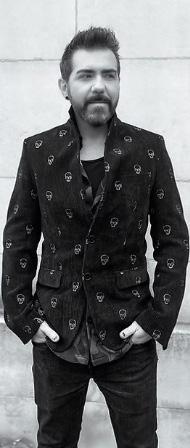
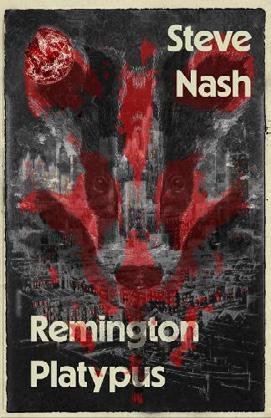
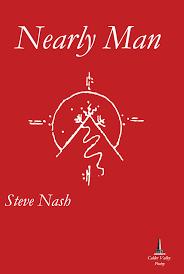
Dr Steve Nash, Lecturer in Literature and Media and Lecturer in PR & Journalism at Leeds Beckett University
Steve Nash is a writer, lecturer, musician born in Yorkshire. His work has been published widely and internationally. Steve completed his PhD studies at York St John University in Literature studies in 2015. During his time as a doctoral candidate Steve became one of the University’s first two graduate teaching assistants, and by the time he completed his studies, he was working as a lecturer across Media, English, and Creative Writing. Steve’s PhD studies focused upon a largely forgotten author of Victorian children’s fiction, and the path of his thesis did not run entirely smoothly. Steve’s supervisors were the late Roger Clarke, and Sarah Lawson Welsh.
Doing a PhD is a little like living underground. It’s dark, you subsist on scraps, and you spend a lot of time clawing at walls no one else can see. When I was a postgraduate researcher at York St John (writing a thesis recovering the work of largely forgotten author, Hesba Stretton), I didn’t stride confidently through the process. I burrowed, blindly, nervously, and occasionally snarled when someone tried to ask how it was going. But I made it out the other side with my sanity intact (mostly), so here are a few lessons I learned from my time in the tunnels.
Badgers are known to dig obsessively until they hit something shiny, which is exactly what it feels like to research a PhD topic. You’ll dig and dig, convinced that the next clump of earth holds the nugget that makes your argument click. Sometimes it does. Sometimes it’s just more dirt. The trick is to enjoy the digging without getting buried. By all means, follow the strange tunnels your research takes you down, but remember to come up for air. Not everything that glitters is a usable citation.
Emerge for Fresh Air (Self- Care)
Even vampires need vitamin D. During my doctorate I often worked until dawn, powered by caffeine and a sense of impending doom. The thesis advances, the body collapses. At some point I realised that self-care isn’t indulgence, it’s maintenance. Eat food that isn’t just beige. Go outside and terrify local dog walkers with your pale, blinking face. Remind yourself you are a person as well as a researcher and be open to the other opportunities that come your way. My PhD was in critical literature, but it was during my time as a PGR that I began working in earnest on creative writing too. It’s tempting to say no when someone invites you to a gig, or the theatre, or even a poetry night because you feel that guilt for not working on your thesis, but that time away from the laptop is really important too.
Bare Your Teeth (The Viva)
Badgers don’t go looking for a fight, but corner them and they’ll defend themselves with an alarming ferocity. The viva is much the same: you don’t need to be aggressive, but you do need to stand your ground. For months I was convinced my examiners would devour me. In the end it was more of a polite nibble, a testing of ideas rather than a mauling. If you’ve done the work, trust it. You know your work far better than the examiners do. And feel free to bare your teeth when you must.
Don’t Fear the Hybrid (Multidisciplinarity)
Academia often likes its creatures neatly classified, but real research is messy. My work sprawled across literature, media, and the gothic, stitched together like a scholarly Frankenstein’s monster. It was awkward. It was unruly. But it was mine. If your project doesn’t fit tidily into one box, don’t panic; hybridity can be strength. Monsters endure.
Life Af ter the Burrow (Beyond the PhD)
Emerging from a doctorate can feel anticlimactic. You expect trumpets, you get silence. The burrow ends, and suddenly the landscape is wide open. For me, that meant continuing to write and teach but also taking my research obsessions into poetry and fiction. My debut novel, Remington Platypus, is a crime story where the characters are animals (the main character being a badger – hence the slightly overwrought metaphor here). Think Watership Down meets Silence of the Lambs. The PhD didn’t close a coffin lid, it prised open a strange new door. Yours will too, in its own peculiar way.
Closing
So, if you are tunnelling through your own research right now, remember: dig deep, breathe often, defend your ground, embrace the mess. And when you finally surface, blinking, thesis clutched in paw, coffee in hand, that’s victory enough.
Dr Matthew Green, Lecturer in Children, Young People and Education
Every viva voce is different, and there is no single route to feeling prepared. What follows is my approach as a I readied myself for my viva at York St John University. I offer it in case elements prove useful, while recognising that each project, postgraduate researcher, and examiner requires a tailored path to preparation and performance.
My preparation began six to twelve months before submission, redrafting thesis chapters and developing a series of journal articles for peer review. That cycle of writing, critique, and revision aided my ability to present a coherent argument, made my methods explicit, and clarified the originality of my research. Reviewers raised key questions that foregrounded my viva preparation, aiding my ability to articulate my approach, my contribution to knowledge, and importantly my position within the thesis. Whilst somewhat labour intensive, this process ensured that I understood how my thesis contributed to knowledge, providing confidence that I met the expected learning outcomes of a PhD.
Immediately after submission, I stepped away from the thesis and other writing for two weeks. I ensured I allowed myself a break from my research, enabling me to process to achievement of submission, before returning to viva preparation with a refreshed mindset. Following this break, I remained research active by drafting articles for peer-review and presented at an academic conference. Fresh audiences raised important questions and offered new perspectives, helping me to develop concise summaries of my findings and discussions.
One month before the viva, my preparation included chapter-by-chapter briefs: one page per chapter covering purpose, key claims, central scholars/ policy, limitations, and contribution to the thesis as a whole. This approach enabled me to understand what each chapter offered and how each chapter linked to produce a coherent argument. As fields develop, I also scanned recent publications to identify emerging trends and positioned my work in relation to them. I
also familiarised myself with my examiners’ recent writing, the recommendations for future research and/or practice they have made, and their postgraduate researchers’ work.
Around 10 days before my viva I had two mock vivas with academics from different disciplines. Their distance from my field required me to define terms, overview my theoretical approach, and detail the significance of my findings. The mock vivas also served to develop my ability to process examiner questions, consider and articulate my response, and seek opportunities for elaboration where necessary. I practiced pausing before answering, asking for clarification when needed, and concluding once I had addressed the question. Following each mock viva, I sought feedback on my response style and debriefed with my supervisors. This process significantly increased my confidence in my ability to perform in the viva and reduced inevitable nerves.
On the day of my viva, I sought to navigate questions actively and deliberately to ensure I was able to take ownership of my thesis and contributions to knowledge. When faced with multipart questions, I wrote them down in keywords, confirmed my understanding, and answered in a numbered sequence. I signposted the structure of my response and tried to keep my answers as tight as possible, seeking to ensure the viva was as conversational as possible. When I disagreed with an examiner comment/question, I acknowledged alternative perspectives yet stated and explained my rationale and referenced my evidence. Above all, I reminded myself that I was the expert in the room on my thesis. A viva is merely a conversation about your work. Own your choices, state your limits, and propose how you could investigate further. For me, this mindset and practical approach to preparation ensured that the viva became not only manageable, but a genuinely enjoyable experience.
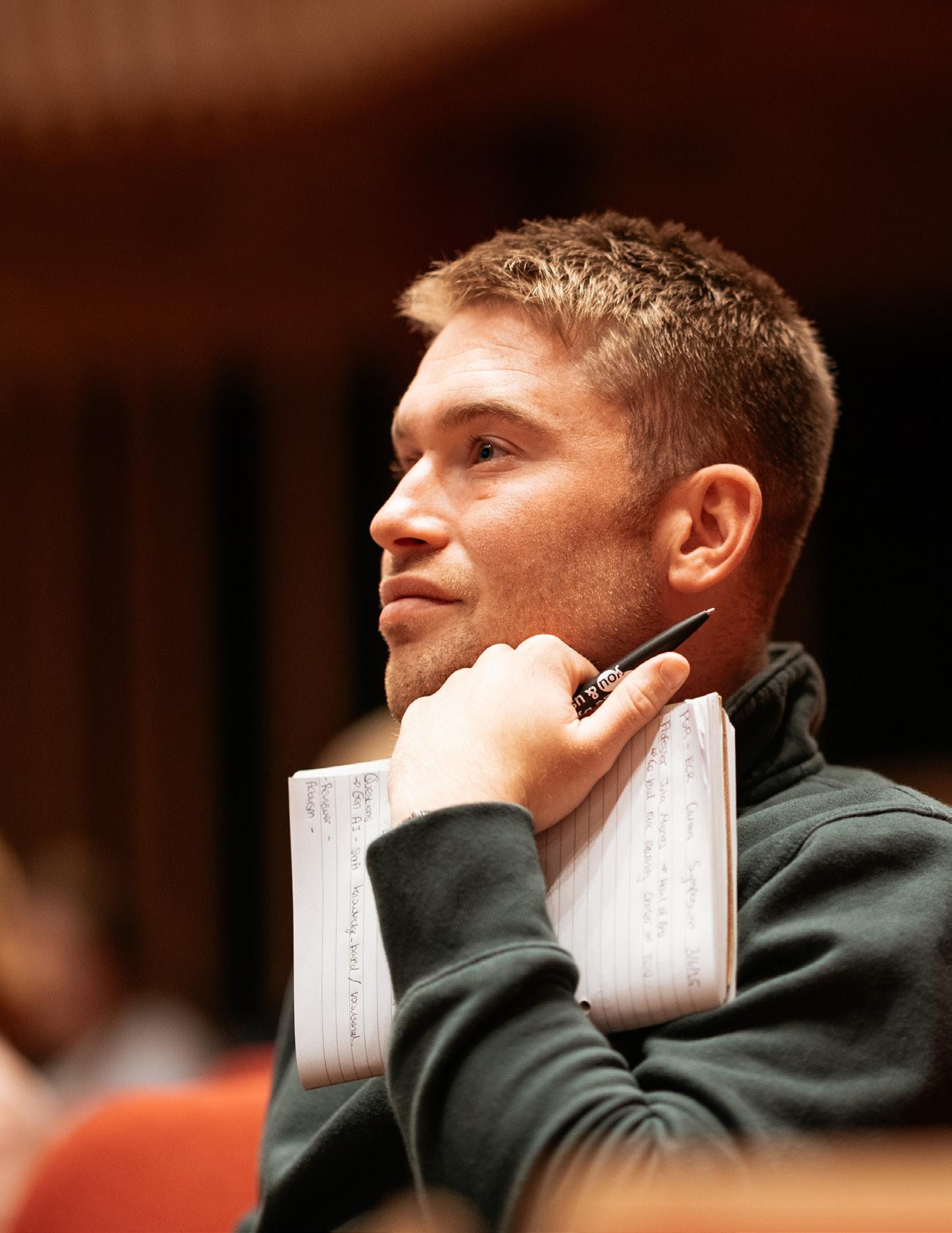
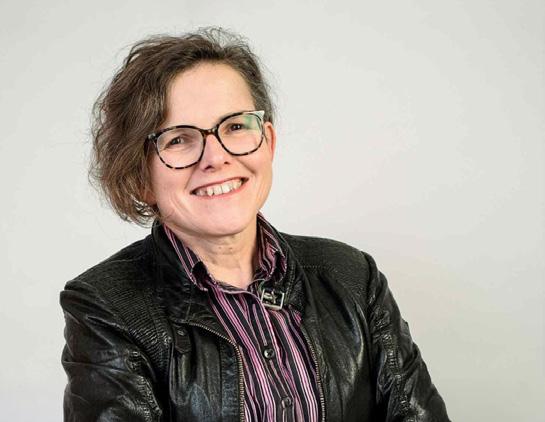
Dr Charlotte Haines-Lyon, Associate Professor: Children, Young People and Education
Many might think of sulking as angrily hiding in one’s bedroom, somewhat childlike, and maybe even occasionally giving the furniture a hard kick or thump. I am not arguing for such practice in this blog, but I am arguing that sulking is an important skill to learn and should be encouraged and embraced by supervisors of Postgraduate Researchers (PGRs).
I started my 7-year part-time PhD in my 40s, having been a freelance writer before that. I was paid by various charities and the government to write articles, reports and policies. I was a professional writer. Imagine my horror, quite early into the PhD, when I discovered that I couldn’t write academically. It really impacted my identity as a writer.
I am not sure what my supervisors actually said but I can pretty much guarantee they didn’t tell me I couldn’t write, or that all my work was rubbish, but that is what I heard. To be fair, six years on, when I get peer reviews back, I read the comments in the same way. And this is why sulking is so important.
It is rare for an academic or a student to take feedback neutrally (see my colleague Caroline Elbra-Ramsay’s work on this); feedback is emotional and relational. The supervisory relationship is unlike other relationships with various complications and weird dynamics – for example, I supervise a colleague who shares my office. The PGR might have a very senior role elsewhere – I supervise several experienced professionals. Additionally, PGRs have a very complicated relationship with their thesis, and when supervisors talk about the thesis, it can feel even more complex.
As I progressed though my PhD, I learnt to navigate the emotions and the supervisory relationship through talking about sulking. I quickly learnt that my strong feelings on
receiving feedback would subside and that I shouldn’t question the feedback immediately but rather sit with it and my emotions for a couple of days before responding. A practice I still maintain for peer reviews.
I learnt to joke with my supervisors, “Ok thank you, I am going to sulk for a few days and then I will deal with the feedback”. This was really helpful. The first time, one supervisor looked at me with a raised eyebrow but quickly we learnt it was helpful to talk about this and build in sulk time. We learnt to talk about the emotions and requisite sulk times involved as we built up our relationship. I learnt to trust him and he learnt to trust me – I would go and sulk and come back and improve my work.
Now as a supervisor to eight PGRs, I encourage them to sulk, to process feedback but also importantly their emotions, and to build in ‘sulk days’ to do this. As I get to know them, it is easier to spot when they really need sulk days and to encourage them to regroup, before tackling the next bit of the thesis. It is vital to get to know our PGRs and build in strategies to deal with feedback.
A good starting place to talk about feedback strategies is sharing our experiences with peer reviews. A huge turning point for me was when my supervisor, a professor, shared his peer reviews with me and I understood that he didn’t breathe out perfect writing and often got quite frustrated about feedback before getting on and grappling with it.
Such a generous practice helped me realise we could all benefit from being a little more honest about the art of dealing with feedback on our writing; learning to sulk well is part of the craft.
Postgraduate Research School
www.yorksj.ac.uk/research pgr.school@yorksj.ac.uk